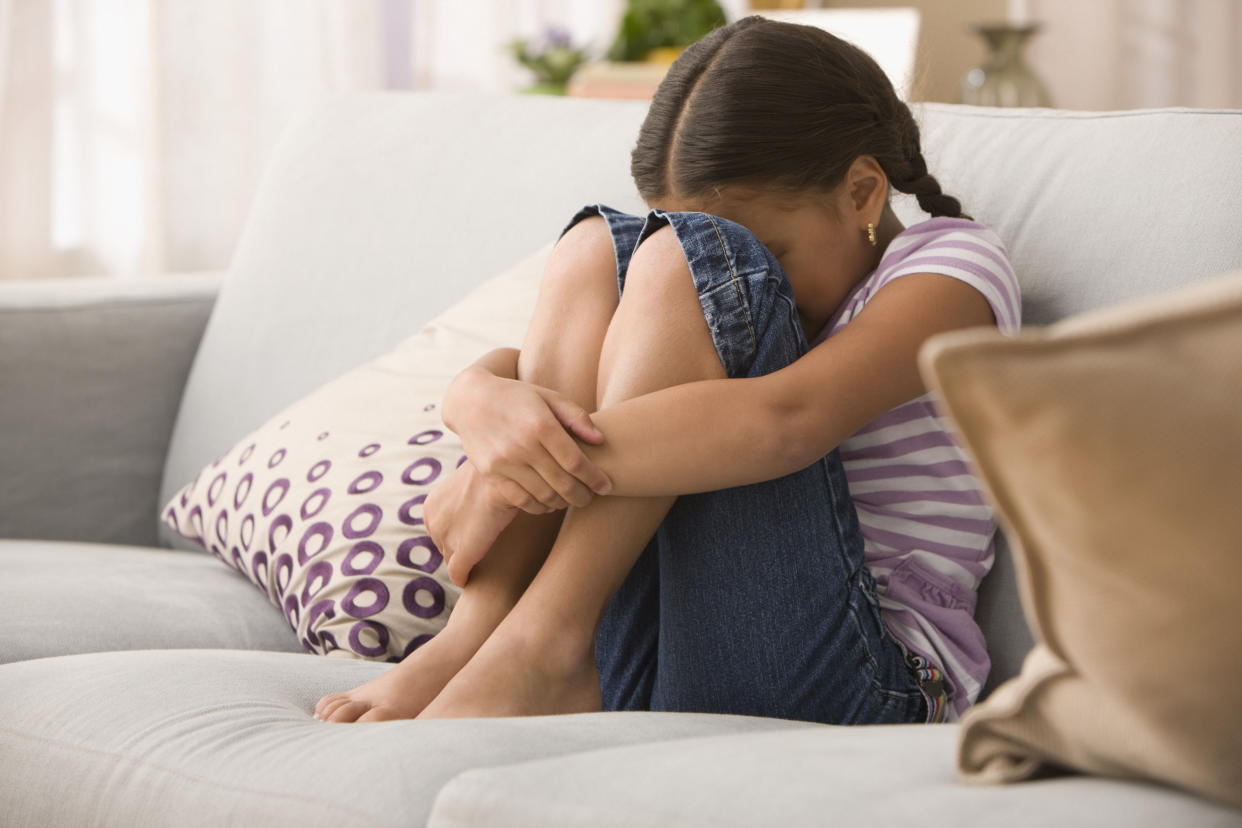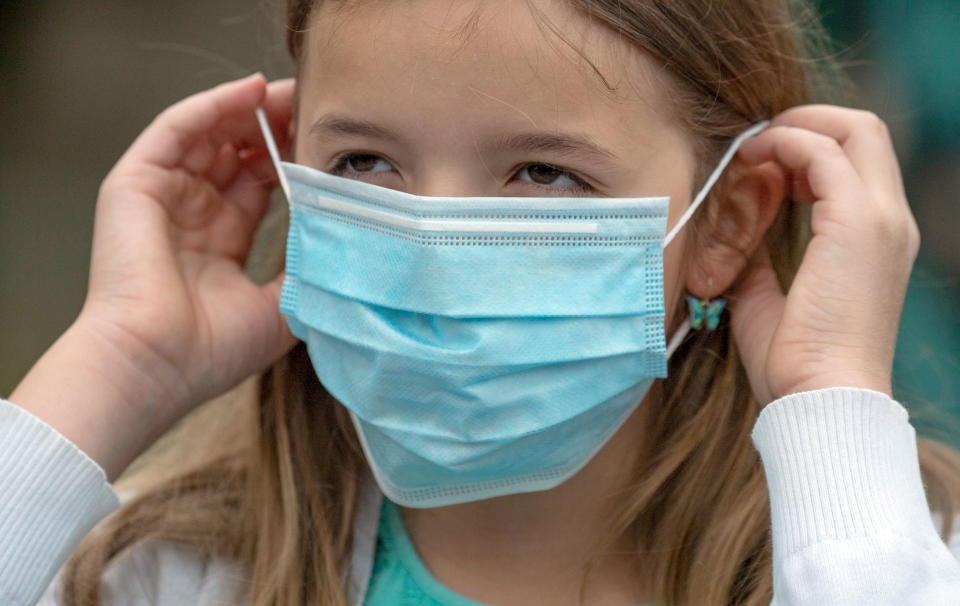Children ‘have PTSD from the coronavirus pandemic’

Children are developing post-traumatic stress disorder (PTSD) as a result of the coronavirus outbreak, a charity has warned.
The Children’s Trust said youngsters are experiencing “vivid nightmares”, a potential warning sign of the condition.
Daily headlines of rising death tolls, with more than 468,000 fatalities confirmed worldwide, are also said to be making young people anxious.
Children from deprived backgrounds are suffering most, as the pandemic widens the chasm between those from affluent and less well-off areas.
Residents of deprived communities are often frontline workers like delivery drivers and social care staff, and many of their children are worried for their parents’ health, particularly if the adults “transfer” their anxieties on to them.
Early research suggests the infection is mild in four out of five cases, but it can trigger a respiratory disease called COVID-19.

‘It seems like it’s going to end humanity’
In its Children in Lockdown report, the Children’s Trust highlighted the mental health struggles many young people are facing as a result of the coronavirus.
It warns the daily fatality figures are particularly distressing for some.
“These kids have seen all of that and internalised it,” said Laurence Guinness, chief executive of the charity.
An 11-year-old boy says in the report: “Since there’s been a lot of deaths, it to me seems like its going to end humanity soon.”
Dr Maria Loades, a clinical psychologist from the University of Bath, has warned lockdown is “likely to increase the risk of depression and probable anxiety, as well as possible post-traumatic stress”.
This is not the first time this issue has been raised, with experts from all over the world previously saying the pandemic could have a “profound” and “pervasive” impact on mental health.
The trust interviewed 2,000 youngsters who had mental health conditions before the coronavirus emerged. More than four in five (83%) said the pandemic had made their struggles worse.
A 10-year-old girl said she “screams into the phone” when friends call to check up on her because she is “so stressed”.
Galiema Amien-Cloete, a primary school headteacher from London, told the BBC she is seeing parental anxieties being transferred on to children.
She also said the lack of a routine, contact with friends and regular education can be “like a bereavement” for a child.
This comes despite children being far less at risk of coronavirus complications than adults if they catch the infection.
‘Mum's going to die, she's not coming back’
The UK lockdown was introduced on 23 March to help stem the spread of infection.
While officials stressed the extreme measure was critical to protect the NHS, experts worried the underprivileged would suffer most.
Boris Johnson shut schools and nurseries on 20 March, and only certain age groups have returned so far.
The Children’s Trust has warned that youngsters without internet access who cannot take part in virtual lessons at home are falling behind their more affluent peers.
The report’s authors stressed this “inequality” must be “accounted for immediately” to avoid long-term consequences.
These children are similarly cut off from online therapy or GP appointments.
Vulnerable children are also unable to see their teachers, who are trained to spot signs of abuse or neglect.
Reports of abuse from teachers are said to have plummeted, but the School Home Support claims there has been a 750% rise in the number of children needing to be referred to school services compared with 2019.
Many point the finger at alcohol overconsumption, with sales reportedly growing by more than a fifth (21%) since the start of lockdown.
Former home secretary and chancellor Sajid Javid warned early on that the outbreak could be a “perfect storm” for child abuse, with vulnerable youngsters “left to isolate alongside their abuser”.
With job security unstable due to the economic downturn, many children are also going hungry.
Research has shown 2 million children have experienced hunger since 23 March, up from the 1.3 million youngsters who were already entitled to a free school meal.
Emergency food bank demand also rose by 89% in April compared with the same time in 2019.
When it comes to key workers, frontline staff are often unable to socially distance from potentially infectious individuals, making them more vulnerable.
One primary-school aged girl said every time her mother leaves for work she thinks “Mum’s going to die, she’s not coming back”.
Research has repeatedly shown that people from black, Asian or ethnic minority backgrounds are more likely to become seriously ill with the coronavirus.
These individuals are often frontline workers who live in overcrowded houses in deprived areas.
Concerns have also been raised for children with autism, who particularly benefit from a routine.
While lockdown is gradually easing, officials have warned that we may have to adapt to a “new normal”, with no one able to say for sure what that could entail.
“I think we need to be mindful that this won't be over for a long time, because we will have to cope with the impact of this on children,” said Amien-Cloete.
How to spot PTSD in children
Children with PTSD often have similar symptoms to adults suffering from the condition.
These may include insomnia, nightmares and losing interest in activities they once enjoyed.
Others may start acting up, avoiding things related to the trauma they experienced or re-enacting the event repeatedly while playing.
It is also common for children to deny the incident happened or become startled when they notice a possible threat.
Some may also experience intense or ongoing sadness, as well as having irritable or angry outbursts.
Children with PTSD may also become withdrawn and act helpless or hopeless.
When it comes to physical symptoms, youngsters may complain of headaches or abdominal pain.
Coronavirus: what happened today
Click here to sign up to the latest news, advice and information with our daily Catch-up newsletter
Read more about COVID-19
How to get a coronavirus test if you have symptoms
How easing of lockdown rules affects you
In pictures: How UK school classrooms could look in new normal
How public transport could look after lockdown
How our public spaces will change in the future
Help and advice
Read the full list of official FAQs here
10 tips from the NHS to help deal with anxiety
What to do if you think you have symptoms
How to get help if you've been furloughed



